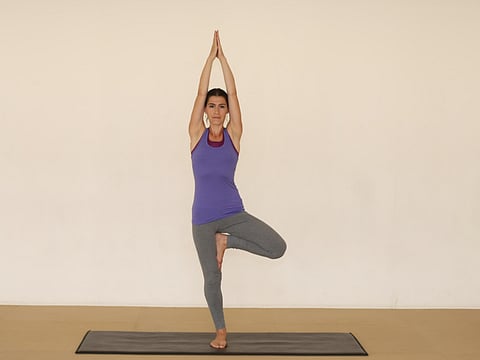Overcome anxiety with yoga
Through regular practice, it is possible to stay calm and focused in stressful situations

Anxiety is a human emotion that everyone experiences at some point or the other. It is characterised by tension, worry and a distinct physical response. However, anxiety disorders such as panic attacks, phobias, post-traumatic stress disorder (PTSD) and obsessive compulsive disorder can be overwhelming.
Anxiety disorders may result from environmental factors — genetics, brain chemistry. Several studies conducted over the last decade have shown that yoga can help deal with anxiety, depression and pain.
Root cause of anxiety
The most common cause of anxiety is stress. Environmental or external factors such as trauma, stress from work, stress from relationships, illness can cause an increase in the anxiety levels of a person. It is a response to an external force or situation. Anxiety can also be triggered by internal factors such as constant negative attitude or critical self-talk.
The stressful thoughts you have may differ but the physiological response in the body is the same. Stress response increases likelihood of anxiety disorders. It also manifests physically where you may experience sweating, palpitations, panting, dry mouth, dizziness, confusion, headache, etc. Improper breathing for prolonged periods is also known to lead to an increase in anxiety levels.
Mind-body is a two-way street
The stress response in the body is automatic but it is not necessary. Through regular conditioning, it is possible to stay calm and focussed in stressful situations. Your thoughts strongly influence the functioning of your body while a healthy and fit can have a pleasant effect on your mental makeup.
As observed by neurobiologists, the things you do and the thoughts you have can change the firing patterns and chemical composition of your brain. Even actions as simple as changing your posture, relaxing the muscles on your face, or slowing your breathing rate, can affect the activity in your brain. These transient changes can become permanent when the body is conditioned to turn them into a habit.
Yoga takes you from distress to no stress
Yoga understands that the mind, body and breath are a single unit. When you work with one of these aspects, it is bound to impact the others. An hour of yoga is known to decrease fatigue, stress, anger, anxiety and elevate mood almost instantly. The combination of postures, breathing and meditation techniques helps take the brain away from stress response towards relaxed thinking.
When you hold a posture, you can fix your mind on the breath or at a sound/music away from you. The posture offers you a challenge while you attempt to stay calm and fix your mind in the present. This habit of focussing on the present may start in a yoga class but can slowly translate into your day-to-day life.
Your breath rate is closely related to your thoughts and emotions. When you are angry or in distress, your breath rate increases rapidly and tends to be erratic, causing chaos in the body. When you are feeling pleasant and happy, your breath rate tends to be slower and relaxed. The brain and body respond positively and you will see an improvement in your ability to tackle stressful situations.
Living in the present is meditation
Research has shown that meditation techniques can help modulate emotional responses overriding automatic reactions or habits and decreasing the brain’s tendency to take things personally. This helps perceive situations with more clarity and respond with a sense of balance.
Yogis, philosophers, psychologists, motivational speakers and life coaches have emphasised the importance of living in the present. Fixing the mind on an object or place or the present is considered dharana or concentration of the mind. This is an aspect of yoga where the mind’s focus is single-pointed and it becomes an observer to an external or internal object.
NEXT WEEK: Clean your system the yogic way
This is an interactive series, in which we will bring you practical tips
on daily living, inspired by the vision of yoga. Write in to tabloid@gulfnews.com with your questions and doubts regarding enhancing your lifestyle through yoga. For more information, call 800-YOGA (9642) or log on to artisticyoga.com
Sign up for the Daily Briefing
Get the latest news and updates straight to your inbox



